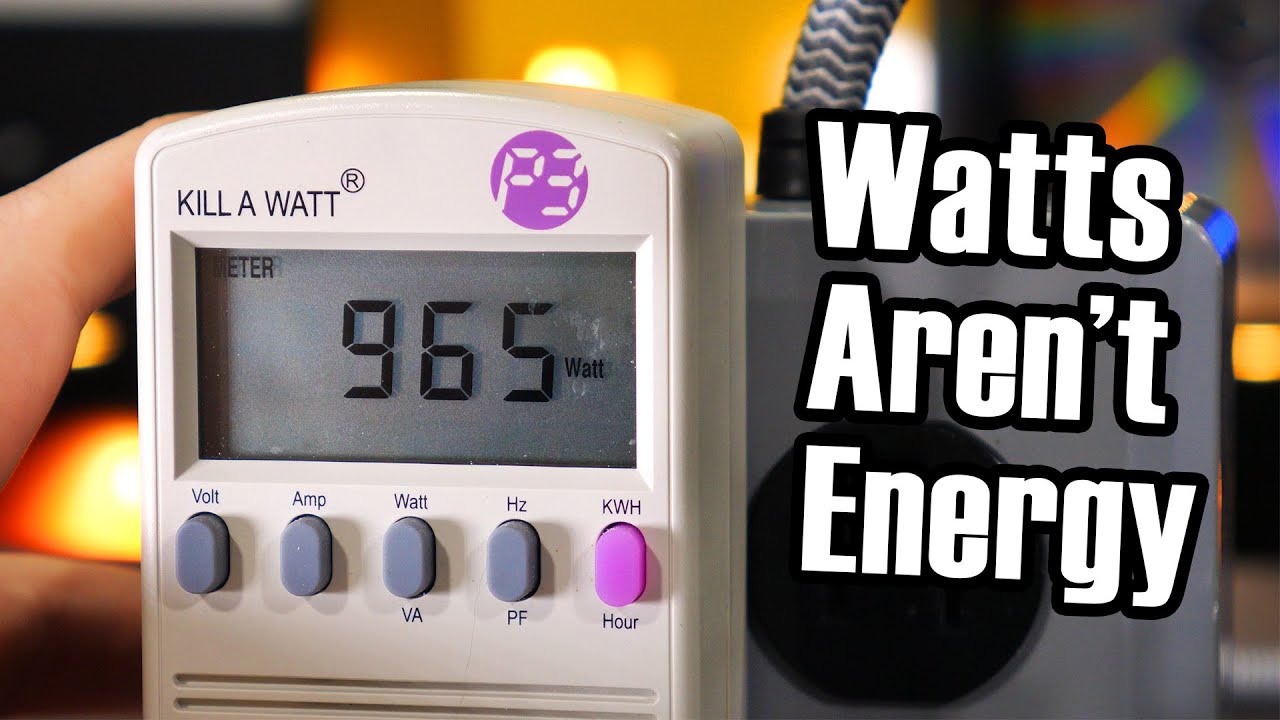So, Alec over the Technology Connections channel made an hour long video explaining the difference with kW and kWh (obviously with other stuff around it).
I’m living in northern Europe in an old house, with pretty much only electric appliances for everything. We do have a wood stove and oven, but absolute majority of our energy consumption is electricity. Roughly 24 000 kWh per year.
And, while eveything he brings up makes absolute sense, it seems like a moot point. In here absolutely everyone knows this stuff and it’s all just common knowledge. Today we went into sauna and just turned a knob to fire up the 6,5kW heaters inside the stove and doing that also triggered a contactor to disengage some of the floor heating so that the thing doesn’t overload the circuit. And the old house we live in pulls 3-4kW from the grid during the winter just to keep inside nice and warm. And that’s with heat pumps, we have a mini-split units both on the house and in the garage. And I also have 9kW pure electric construction heater around to provide excess heat in case the cheap minisiplit in garage freezes up and needs more heat to thaw the outside unit.
And kW and kWh are still commony used measurement if you don’t use electricity. Diesel or propane heaters have labels on them on how many watts they can output right next to the fuel consumption per hour and so on. So I’m just wondering if this is really any new information for anyone.
I assume here’s a lot of people from the US and other countries with gas grid (which we don’t really have around here), is it really so that your Joe Average can’t tell the difference between 1kWh of heat produced by gas compared to electricity? I get that pricing for different power sources may differ, but it’s still watt-hours coming out of the grid. Optimizing their usage may obviously be worth the effort, but it’s got nothing to do with power consumption.
So, please help me understand the situation a bit more in depth.
kW/kWh aren’t commonly used outside of electrical applications in the US, so people are less readily able to quantify and compare in other contexts. Looking at a variety of natural gas companies’ bills, you’ll get volume multiplied by a therm factor instead of simply using kWh; horsepower for not just cars but even electrical motors and pumps.
I think the average person will have looked at their electricity bill and put the basics together about watts and watt hours. As for comparison with natural gas, I think he didn’t touch on the real metric people then turn to- cost. Depending on the state it can be much cheaper to use gas vs electricity.
Yeah, electric motors are what I notice the most. Be it on washers/dryers, garbage disposals (which range from 1/3, 1/2, 3/4, 1HP) and more.
I haven’t watched it but its really simple. If you receive 1kW within 1hr and you compare that amount of power to 1kW over one second things are much different. The first is like a nice heater in a cold winter night…nice steady energy, a little bit of power. The second is like hell hole, tons of energy but still only a little bit of power. Power is the ability to do work or simply move things. Energy is the total amount of moving things regardless of the actual power used. So if you toasted a toast, that was a lot of power delivered quickly, but you could also do all that work slowly over centuries and eventually end up with the same molecular arrangement using the same amount of energy.
“1kW within 1hr” isn’t power. That’s energy.
“nice steady energy”? You mean nice steady power, right?
“The second is like hell hole, tons of energy but still only a little bit of power.” No. They are both precisely the same energy.
“So if you toasted a toast, that was a lot of power delivered quickly.” No. That is a lot of energy delivered quickly.
I typically wouldn’t be pedantic about this, except that this is precisely the point the video is making. These two unit types are often confused.
“1kW within 1hr” isn’t power. That’s energy.
The watt is always power, not energy. I’m assuming OP here got some prepositions mixed up and meant 1 kW delivered for 1 hr. That amounts to an energy of 1 kWh.
The second is like hell hole, tons of energy but still only a little bit of power.” No. They are both precisely the same energy.
No, they are the same power. The energy in the case where 1 kW of power is delivered for 1 hour is 1 kWh. The energy in the case of 1 kW delivered for 1 s is about 0.28 Wh.
If instead 1 kWh was transferred over the course of 1 hour, that is an average power of 1 kW (but does not have to be uniform, without more information we can’t know the power profile). If 1 kWh is transferred over the course of 1 s, that is an average power of 3.6 MW which is the example I think OP was getting at (ref. hell hole comment).
Full disclosure, I didn’t watch the video yet, but it’s likely a difference of environmental impact.
He’s described in previous videos how burning gas at home is less efficient from the standpoint of a carbon footprint. I imagine this video is to help explain everything in a way that helps you come to that conclusion yourself. Teach a man to fish instead of just giving a fish and what not. So you can apply the knowledge to other things in your life
New Technology connections video drops:

I’m going to go buy a kill-a-watt.
Do it, it teaches you things.
Most of your power isn’t going where you think.
Oh I love this stuff.
My dishwasher pulls over 1000W, but overall actual usage pales in comparison to my server cluster, which utilizes a multiple 35W mini PCs.
I started measuring a bunch of things in February (using zigbee-compatible smart plugs to HA), so here is a graph of the above for the entire month of March:

It was eye opening, to say the least.
I moved into a tiny home and got one for measuring the current draw of my kitchen appliances and keeping track of the cost of my electric space heater ($40/month so far, yeesh)
I’m over here heating water in a kettle because of Technology Connections (and also pre-heating my dishwasher)
Its the midwest pragmatism that sells it.
I just do what he says because it sounds so practical.
lot of people from the US with gas grid (which we don’t really have around here), is it really so that your Joe Average can’t tell the difference between 1kWh of heat produced by gas compared to electricity
Right, because for most people gas is metered and sold by the CCF, and not converted into kW at any point in the chain.
So I know i used 30ccf last month, but there’s zero indication what that is in kW, because we usually don’t convert between the meter (which is volumetric) and the billing, which could be anything but why bother?
Reticulated gas is charged by the kWh here in New Zealand. The meter may well be calibrated in m³ (I don’t have gas at home, so I don’t know for sure) but all pricing is energy, not volume.
For bonus points, if instead you buy your gas in cylinders - a pair of 45kg (~100lb) cylinders is a common installation for houses without piped gas - those are sold simply by the unit. The best conversion for that I can find is one energy retailer describing one 45kg cylinder as 2200MJ (611kWh).
I expect this is one of those things that is overall horribly inconsistent depending on where you live.
Also from Europe, gas is measured/billed in kWh here as well.
Not everywhere, in Lithuania they charge per m³.
I sometimes make a conscious effort to understand electricity. For a few days, I then think I understand what’s going on and then promptly I forget.
(Yes, I shall watch this video.)
In here absolutely everyone knows this stuff and it’s all just common knowledge.
Absolutely not. Not even close.
haven’t seen it so far, but technology connections will always get an upvote.
also consider subscribing to his channel, his videos are amazing.
If you think the average person understands watts, you live in a bubble, straight and simple. You have a very skewed notion of the average person.
We live in a world where people demanded (and succeeded) in having the Meteorological Service of Canada to report windchill as “feels like C” instead of, ya know, a measure of actual heat loss in Watts / M^2 / s
You say that like it’s a bad thing? I prefer not to dust off my slide rule everytime I want to know how cold it is out.
Yeah, just give me actual temp and wind speed, and I’ll get a feel for what’s cold by going outside.
Idk, I kind of like knowing how many layers of clothes I need to put on before I leave the house. Especially when the wind chill can make it feel like another -10°C pretty easily.
Same. I just look at the temp and wind speed and make an educated guess, erring on the side of more layers.
The first time they did the feels like scale… My father’s colleagues were involved. They took a sample of people and put them in wind tunnels and sprayed them with water and said hey how’s it going over there.
I wish more than anything I was joking right now.
I think you are greatly overestimating the basic functional knowledge of the general public…
is it really so that your Joe Average can’t tell the difference between 1kWh of heat produced by gas compared to electricity?
Yup.
I totally understand electricity because it’s pretty intuitive. Everything is advertised in watts, my bill comes as kilowatt hours, so it’s pretty easy to calculate how much energy something uses by plugging in a kill-a-watt and measuring it.
My gas is billed in therms. I don’t really know what that is, nor do I know what the flow rate is for my furnace or gas stove, so I have no concept for how much energy I’m using. I don’t have an electric one to compare with, so I that’s not an option either. So how exactly would I get to the point where I would be able to compare the two without a lot of annoying testing? Even then it would be extremely imprecise.
And no, it’s not “watt hours coming out of the grid,” except in the pedantic sense that they can be converted. They come from very different sources, so it’s like comparing an EV to a horse, and while you could, it’s completely nonsensical.
But yes, at some base level your average American knows there’s a connection between the two (after all, I can choose between electric heat/heat pump and a gas furnace), but they’d rely on an expert to estimate the monthly price difference between options, since that’s ultimately what we care about. The problem is mentioned near the end of the video, HVAC experts don’t seem that familiar w/ heat pumps, so you may not get a decent estimate, depending on who your technician is. And that adds to the misinformation.
Power is water throughput in a pipe, energy is water filling a bucket. Simplest way I’ve found to explain it in my 15 years in the energy space.
Power is a measurement of the velocity and volume of water flowing through a pipe at a given instant*
I’m so sorry, I am officially ‘that guy’, taking a simple analogy and making it annoying…
Follow-up video idea: speed ≠ distance
The one that I think more people misunderstand is temperature Vs heat Vs something feeling hot/cold. One is a property, one is energy, and the other is the transfer of energy.
You know a nation of people who may not be able to articulate their understanding, but definitely have a high intuitive understanding of that?
We Finns.
100C sauna and no problem sitting on wood, but happen to touch something metal and oooh-weee.
Also same thing happens the others way around when it’s - 20c outside. I don’t think there’s many people in Finland who don’t have a core memory of what cold metal tastes like in winter, because of the resulting trauma. And it doesn’t even need to be metal to stick.
Nicely explained.
100C sauna???
It’s perfectly commonplace to have at least a 100 degree sauna.
I think something like 140 is around the hottest I’ve been in.
The air is that temperature, but there’s also a ton of moisture in the air. You can take it for a few minutes at a time, then optimally you go take a dip off a pier into a lake or the sea. When I was in that 140c sauna it was a proper wood heated large sauna at my confirmation camp, it was on an island in the Baltic so we could run out the sauna and jump into the Baltic Sea. It wasn’t warm at all, but the intense heat of the sauna having warmed all the top tissues and muscles, you get a sort of immunity to the cold. Which lasts for a little while, and when you start getting cold enough, you go back to the sauna, and because the cool water has now cooled the skin and muscles, you get a resistance to the heat for a while.
Rinse and repeat. Literally.
This cycle supposedly has benefits for circulation and muscles.
And having done it ton in my life I don’t doubt that at all.
Usually I have to settle for the sauna in my apartment though. (I live in a cheap rental but a sauna is default in pretty much all buildings built after the 90’s.) And then either going to balcony to cool off a while or take cool shower. It’s not as nice, but it’s more or less the same.
Although I don’t rip the most out of my electric stove to get the most heat. I have it set on pretty low and I just use a lot of löyly. Probably I’d say my normal saunas are maybe around 90-110 degrees at the most. A sauna below 80 degrees is considered a “Swedish sauna”, which is to say we mock them as not being strong and manly as us and so Swedes would be afraid of having a “proper” sauna.
And to be honest the Swedes are pretty on board with this whole stereotype I guess, seeing us as mute emotionally distant brutes. Here’s a cool Swedish commercial featuring a Finnish man. They made it. (that’s not the real title though just the yt video title)
I’d really like to try that someday
I believe, internationally, lots of places which have saunas also have pools or even cold pools. I imagine. Like high class gyms or smth.
But I’ve heard several stories of Finns being abroad and going to a sauna and being prevented from tossing water on the stones (löyly = it’s sort of the water and the heat that results from throwing it, roughly how you’d use “gas” in relation to cars, more gas can mean more petrol or pressing on the gas pedal harder, that sort of word), and the employees saying “you can’t do thaw to it’ll break the stove” because they don’t understand how saunas work.
And to do this to the best effect you need a proper löyly to the point you pour cold water from the löyly bucket on top of your head to bear it for a while longer for all the muscles to really warm up. And then for maximum shock quick jump to cold water, or sometimes just a snowbank. That’s common as well. Hurts like bitch though if you do it with the wrong kind of snow, like jumping on a bed of freezing razors. (The top of snow that was quite soft earlier had frozen and I didn’t see it in the dark and jumped into the bank and there was like a half an inch of raspy ice on top before I broke through to the softer snow. Or I just didn’t care being either so young as not to or so drunk as not to. Probably both.)
And if you’re gonna throw a strong löyly, or even löyly at all in a public sauna, it’s proper etiquette to ask for consent from everyone. Although now that I wrote that I have a feeling asking for consent in some non-Finnish public saunas may have a different meaning, as far as I’ve understood from popular media.
Yeah, what the hell is this video subject. I honestly thought this stuff was common sense.
Should be but search for “kwh per hour” and there’s plenty of people who seem confused by it all.

People complaining about this video have clearly not watched much Technology Connections; I enjoyed it immensely. It’s right in line with how Alec normally does his videos. We who are loyal to the Great Alec expect the pedantic content.

















